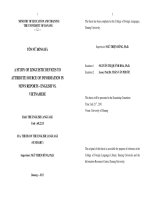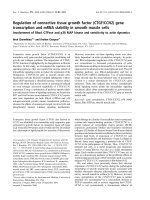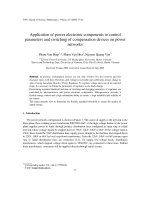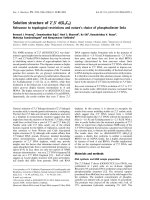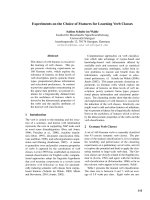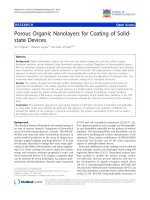appopriate choice of connective devices
Bạn đang xem bản rút gọn của tài liệu. Xem và tải ngay bản đầy đủ của tài liệu tại đây (6.19 MB, 49 trang )
<span class="text_page_counter">Trang 1</span><div class="page_container" data-page="1">
APPOPRIATE CHOICE OF CONNECTIVE DEVICES
</div><span class="text_page_counter">Trang 4</span><div class="page_container" data-page="4">DEFINITION
</div><span class="text_page_counter">Trang 5</span><div class="page_container" data-page="5">• Connective devices, also known as transition words or linking words, are words or phrases that help us connective ideas, clarify relationships
between sentences, and guide the reader through the logical flow of text.
• They act as the glue that holds writing together, ensuring smooth transitions and preventing choppy or confusing sentences.
</div><span class="text_page_counter">Trang 6</span><div class="page_container" data-page="6"><small>Some examples of different types of connective devices and their functions:1. Adding:</small>
<small>• · And, also, besides, in addition, etc.</small>
<small>These connectives combine ideas or information, building upon what came before2. Contrasting :</small>
<small>• · But, however, yet, on the other hand, etc.</small>
<small>These connectives highlight differences or disagreements between ideas.3. Sequencing:</small>
<small>• Then, next, finally, therefore, etc.</small>
<small>These connectives show the order of events or ideas, guiding the reader through a chronological or logical progression</small>
<small>4. Cause and effect:</small>
<small>• Because, so, therefore, consequently, etc.</small>
<small>These connectives explain how one idea or event leads to another, revealing cause-and-effect relationships</small>
</div><span class="text_page_counter">Trang 7</span><div class="page_container" data-page="7"><small>5. Explaining:</small>
<small>• Because, due to, as a result of, etc.</small>
<small>These connectives clarify or provide the reason behind a previous statement6. Emphasizing:</small>
<small>• Indeed, in fact, certainly, etc.</small>
<small>These connectives highlight the importance of a particular point or idea.7. Summarizing:</small>
<small>• In short, to sum up, in other words , etc.</small>
<small>These connectives bring together key points and provide a concise overview of the main idea</small>
</div><span class="text_page_counter">Trang 8</span><div class="page_container" data-page="8">Use of connective devices in translation
</div><span class="text_page_counter">Trang 9</span><div class="page_container" data-page="9">Understanding function
Choosing Equivalents
Context and style
Grammatical Compatibility
</div><span class="text_page_counter">Trang 10</span><div class="page_container" data-page="10">Understanding function
</div><span class="text_page_counter">Trang 11</span><div class="page_container" data-page="11">->Function in the source language -Context and sentence structure
</div><span class="text_page_counter">Trang 12</span><div class="page_container" data-page="12">English: Universities provide students with good chances of career paths;... many people go to universities.
Vietnamese: Đại học cung cấp cho người học nhiều cơ hội phát triển con đường sự nghiệp. Vì thế, rất nhiều người muốn ghi danh vào trường đại học)
->Cause and effect
</div><span class="text_page_counter">Trang 13</span><div class="page_container" data-page="13">-English: Having a good breakfast is a basic condition for a good day... it helps us have a strong health.
-> Besides / In addition
Vietnamese: Việc có một bữa sáng chất lượng là điều kiện cơ bản cho một ngày tốt lành. Bên cạnh đó, nó cịn giúp chúng ta có được một sức khỏe tốt
-> Adding
</div><span class="text_page_counter">Trang 14</span><div class="page_container" data-page="14">-English : Life isn’t long, ________, we still waste a lot of time -> however
Vietnamese: Cuộc sống tuy không dài nhưng chúng ta vẫn đang lãng phí rất nhiều thời gian)
-> Contrasting
</div><span class="text_page_counter">Trang 15</span><div class="page_container" data-page="15">Choosing equivalents
</div><span class="text_page_counter">Trang 16</span><div class="page_container" data-page="16">English: Universities are normally expensive in my country. So, not everyone can afford it.
Vietnamese: Đại học thường rất đắt đỏ ở nơi tơi sống. Do đó/Vì thế/Cho nên, khơng phải ai cũng có đủ điều kiện để học đại học
</div><span class="text_page_counter">Trang 17</span><div class="page_container" data-page="17">English: He misbehaved with his boss; as a result, he lost the job
Vietnamese: Anh ấy cư xử không đúng mực với sếp của mình; kết quả là/vì vậy anh ấy mất việc.
</div><span class="text_page_counter">Trang 18</span><div class="page_container" data-page="18">English”: and, also, besides, in addition -> Vietnamese: và, cũng, bên cạnh, ngoài ra
English”: but, yet, however, on the other hand -> Vietnamese: nhưng, dù vậy, tuy nhiên, mặt khác
English”: then, next, finally -> Vietnamese: sau đó, tiếp theo, cuối cùng
English”: because, so, therefore, consequently -> Vietnamese: vì, nên, do đó, kết quả là
English”: because, due to, as the result of -> Vietnamese: vì, nên, do đó, kết quả là
</div><span class="text_page_counter">Trang 19</span><div class="page_container" data-page="19">Context and style
</div><span class="text_page_counter">Trang 20</span><div class="page_container" data-page="20">• ‘’ Therefore’’ > ‘’ So’’ • ‘’ However’’ > ‘’ But’’
*Formal and informal tone
*Cultural nuances
</div><span class="text_page_counter">Trang 21</span><div class="page_container" data-page="21">English:Sarah studied well so she got a scholarship
-> Sarah học rất giỏi nên cô ấy nhận được học bổng ( Formal tone, ‘’nên’’ implies the result of sarah’s effort in study)
-> Sarah học giỏi thì được học bổng thơi ( informal tone,’’thì’’ suggests a natural connection )
</div><span class="text_page_counter">Trang 22</span><div class="page_container" data-page="22">Grammatical Compatibility
</div><span class="text_page_counter">Trang 23</span><div class="page_container" data-page="23">• ‘’ Do’’ > ‘’ Vì’’ --> Cause and effect
• ‘’Tuy nhiên’’, ‘’Nhưng’’ --> Contrasting clause
</div><span class="text_page_counter">Trang 24</span><div class="page_container" data-page="24">English: The computer had access to the Internet. However, it is still offline
Vietnamese: Máy tính đã truy cập được Internet. Tuy nhiên, nó vẫn ngoại tuyến
</div><span class="text_page_counter">Trang 25</span><div class="page_container" data-page="25">English: The problem of over-using plastic products might be due to lack of strict regulations
Vietnamese: Vấn đề lạm dụng sản phẩm nhựa có thể do thiếu các quy định chặt chẽ
</div><span class="text_page_counter">Trang 26</span><div class="page_container" data-page="26">Mini game
</div><span class="text_page_counter">Trang 31</span><div class="page_container" data-page="31">5. Tỷ lệ tăng trưởng hàng năm của nhà hàng đã không ngừng tăng với tỷ lệ ấn tượng là 15%
trong suốt ba năm qua
The restaurant's annual growth rate has been steadily
climbing at an impressive 15% over the past three years
</div><span class="text_page_counter">Trang 32</span><div class="page_container" data-page="32">6. Nhà hàng gặp phải tình trạng thiếu nhân
viên trong mùa lễ, khiến cho quản lý phải tăng cường nhân lực
The restaurant faced staffing shortages during the holiday season, prompting the management to increase human
resources
</div><span class="text_page_counter">Trang 33</span><div class="page_container" data-page="33">7. Tổng cục thống kê đã tiến hành một cuộc khảo sát về ngành công nghiệp nhà hàng
The General Statistics Office conducted a survey on the restaurant industry
</div><span class="text_page_counter">Trang 34</span><div class="page_container" data-page="34">8. Khách sạn đã triển khai một hệ thống đặt chỗ cho phép khách hàng dễ dàng đặt phòng
trực tuyến
The hotel implemented a reservation system, allowing guests to easily book rooms online
</div><span class="text_page_counter">Trang 35</span><div class="page_container" data-page="35">9. Hiện nay, nhiều nhà hàng cung cấp các lựa chọn thanh toán điện tử qua máy thẻ tín dụng
và ứng dụng thanh toán di động
Currently, many restaurants offer online payment options through credit card terminals and mobile payment apps
</div><span class="text_page_counter">Trang 36</span><div class="page_container" data-page="36">PRACTICE
</div><span class="text_page_counter">Trang 37</span><div class="page_container" data-page="37"><small>- Text 2: Dự báo về ngành quản trị nhà hàng ăn uống</small>
<small>Dưới dây là một số dự báo và số liệu về ngành này tới năm 2030:Tăng trưởng doanh thu của ngành quản trị nhà hàng ăn uống: </small>
<small>Theo báo cáo của Euromonitor International, doanh thu của ngành ăn uống và dịch vụ ăn uống sẽ tăng trưởng mạnh mẽ từ năm 2021 đến năm 2030, với tỷ lệ tăng trưởng hàng năm khoảng 5,5%. Dự kiến rằng tốc độ tăng trưởng sẽ chậm lại sau khi đạt đến mức 1,2 tỷ USD vào năm 2030, nhưng vấn sẽ duy trì mức tăng trưởng khá ổn định.</small>
</div><span class="text_page_counter">Trang 38</span><div class="page_container" data-page="38">Text 2: Forecast of the hospitality management industry
There are some forecasts and data of this industry by 2030: Revenue growth of the hospitality management:
Euromonitor International's report shows that the revenue of the food industry and catering services will grow fiercely with an annual growth rate of about 5.5% between 2021 and 2030. It is expected that the growth rate will slow down after reaching $1.2 billion by 2030, however it will still maintain a quite stable growth rate.
</div><span class="text_page_counter">Trang 39</span><div class="page_container" data-page="39">-Nhân lực ngành guản trị nhà hàng ăn uống:
Theo Tổng cục Thống kê, dự kiến ngành quản trị nhà hàng và dịch vụ ăn uống sẽ có khoảng 1,2 triệu lao động vào năm 2025 và khoảng 1,4 triệu lao động vào năm 2030. Trong đó, các vị trí quản lý và đầu bếp được cho là sẽ tiếp tục là những vị trí có nhu cầu tuyển dụng cao nhất.
Một số xu hướng phát triển của ngành quản trị nhà hàng ăn uống
</div><span class="text_page_counter">Trang 40</span><div class="page_container" data-page="40"><small>- Human resources in the hospitality management industry : </small>
<small>According to the General Statistics Office, it is expected that the catering and food service management industry will employ about 1.2 million workers by 2025 and about 1.4 million workers by 2030. In particular, management and chef positions are expected to continue to be the positions with the highest demand for recruitment.</small>
</div><span class="text_page_counter">Trang 41</span><div class="page_container" data-page="41">-Công nghệ: Công nghệ đang trở thành yếu tố quan trọng trong việc quản lý nhà hàng, từ
việc đặt hàng trực tuyến, quản lý hệ thống đặt chỗ, thanh toán điện tử đến việc quản lý kho
hàng và dữ liệu khách hàng.
</div><span class="text_page_counter">Trang 42</span><div class="page_container" data-page="42"><small>Some trends in the development of the hospitality management industry:</small>
<small>-Technology: It is becoming a key point in this field including online ordering, reservation system management, e-payment and even stock management and customer data.</small>
</div><span class="text_page_counter">Trang 43</span><div class="page_container" data-page="43"><small>- Khách hàng đòi hỏi cao hơn về chất lượng và trải nghiệm ăn uống: Khách </small>
<small>hàng ngày càng địi hỏi chất lượng món ăn tốt hơn, đội ngũ nhân viên phục vụ chuyên nghiệp hơn và không gian ăn uống đẹp và thoải mái hơn.</small>
<small>- Sự phát triển của nhà hàng “fast-casual”: Đây là một mơ hình nhà hàng kết hợp giữa nhà hàng nhanh và nhà hàng sang trọng, khách hàng được tận hưởng trải </small>
<small>nghiệm ăn uống tốt hơn so với nhà hàng nhanh, nhưng vẫn giữ được tính tiện lợi và giá cả hợp lý.</small>
</div><span class="text_page_counter">Trang 44</span><div class="page_container" data-page="44"><small>Khách hàng đòi hỏi cao hơn về chất lượng và trải nghiệm ăn uống: </small>
<small>Khách hàng ngày càng địi hỏi chất lượng món ăn tốt hơn, đội ngũ nhân </small>
<small>viên phục vụ chuyên nghiệp hơn và không gian ăn uống đẹp và thoải </small>
<small>mái hơn.</small>
<small>Customers demand higher quality and dining experience: Customers </small>
<small>increasingly expect better food quality, more professional service </small>
<small>staff, with a beautiful and comfortable dining space.</small>
</div><span class="text_page_counter">Trang 45</span><div class="page_container" data-page="45"><small>Sự phát triển của nhà hàng “fast-casual”: Đây là một mơ hình nhà hàng kết hợp giữa nhà hàng nhanh và nhà hàng sang trọng, khách hàng được tận hưởng trải nghiệm ăn uống </small>
<small>tốt hơn so với nhà hàng nhanh, nhưng vẫn giữ được tính tiện lợi và </small>
<small>giá cả hợp lý.</small>
<small>The development of the "fast-casual" restaurant: This is a restaurant model that combines fast food and fine dining, </small>
<small>allowing customers to enjoy a better dining experience than fast food restaurants, but still maintaining convenience and reasonable prices.</small>
</div><span class="text_page_counter">Trang 46</span><div class="page_container" data-page="46">REVIE W
1.What is the main idea?
<small>-> The text provides forecasts, statistics, and trends about the restaurant and food service management industry. </small>
2. Where is the text probably taken from?
<small>-> Article with source:</small><small> What is the writer’s main purpose?
<small>-> The writer aims to inform readers about industry growth, workforce trends, and emerging developments in restaurant and food service management.</small>
</div><span class="text_page_counter">Trang 47</span><div class="page_container" data-page="47">REVIE W
4. Who are the intended readers?
<small>-> The text targets individuals and businesses involved in the industry, as well as those interested in understanding its future prospects.</small>
5. In what style is it written?
<small>-> The text adopts an informative style, presenting objective information through facts, forecasts, and statistics.</small>
</div>